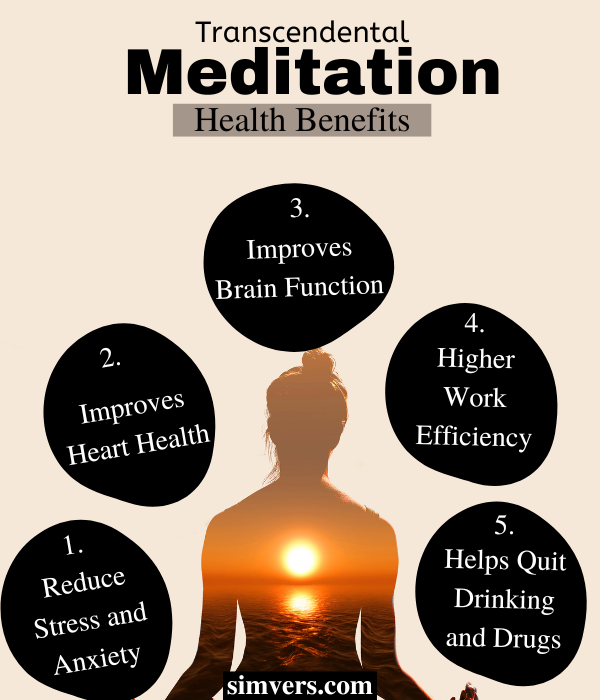
With all the technology and stress in our lives today, it’s no surprise that many of us feel overwhelmed. The world constantly bombards us with emails, texts, and social media notifications, which can cause a lot of anxiety and stress.
So, how can you deal with stress and anxiety? The answer may be as simple as taking a few minutes each day to meditate. While you might have heard of meditation before, there are many types—and it’s hard to know which one is right.
If you want something that will help relieve stress, improve your focus, and even boost your mood, try transcendental meditation (TM).
This article will explore transcendental meditation, how it works, and why it might help you achieve a state of relaxation. Keep reading to learn more.
What is transcendental meditation?
Maharishi Mahesh Yogi developed the transcendental meditation technique in the 1950s. It’s based on ancient Indian practices and involves
- closing your eyes while sitting with crossed legs or in a chair,
- taking deep breaths through your nose, and
- repeating a mantra while letting thoughts pass by without engaging them.
The goal is to attain a state of relaxation and heightened awareness called “pure consciousness.” There are two types of transcendental meditation: mantra-based and non-mantra-based.
In mantra-based TM, you repeatedly repeat the same word or phrase (called a “mantra”) for 20 minutes or more. You want to clear your mind of all other thoughts so that only the mantra remains.
In non-mantra-based TM, you sit quietly and allow any thoughts or sensations to come and go without engaging them.
Does transcendental meditation have health benefits?
Experts believe transcendental meditation has a wide range of health benefits, including

Reduces stress and anxiety
Stress and anxiety plague the modern world. Experts have shown that transcendental meditation reduces stress and anxiety in many people, especially when practiced regularly. It may also help with depression, drug addiction, insomnia, and pain management.
Reduces blood pressure and improves heart health
Research has shown TM to lower blood pressure in healthy people and those with high blood pressure. It also reduces heart attack, stroke, and coronary artery disease risks.
It improves brain function and lengthens the attention span.
Transcendental meditation has increased brain function in many areas, including short-term memory, intelligence, and attention span.
It helps you have higher work efficiency.
We want to perform well at work, but sometimes we don’t have the energy. Transcendental meditation may help you feel more energized and less stressed during the day.
This can improve your work efficiency and even help you get ahead at work by improving your focus and productivity.
It helps in quitting alcoholism and addictions.
It’s challenging to stop if you struggle with an addiction, such as alcoholism or drug abuse. Transcendental meditation may help you get off these substances by reducing your cravings and increasing your ability to cope with stress.
It may also help you avoid relapses after you’ve quit and reduce the long-term effects of substance abuse on your brain function.
MORE:
- Gods & Goddesses of Death
- Are Adam And Eve In Heaven Or Hell
- Catholic vs. Protestant
- Church True Meaning
- Bible about Circumcision
How many people practice transcendental meditation?
Transcendental meditation is among the most popular meditation techniques in the world. According to the official Transcendental Meditation website, over ten million people practice TM daily.
Celebrities like Jerry Seinfeld and Kendall Jenner have practiced it, and many corporations worldwide also use it for employee health benefits.
How can I learn transcendental meditation?
The Maharishi Foundation has certified teachers in almost every country worldwide who can teach you how to meditate. It’s not a technique you can learn by yourself.
You need a teacher to guide you through the process. The teacher will begin by showing you how to meditate and then provide feedback on your progress. It’s recommended that you practice TM for 20 minutes twice a day—once in the morning and once in the evening—for at least two weeks.
The best part is that your teacher will personalize your meditation program to fit your needs. This way, it will not bore you.
What Is the Cost of Transcendental Meditation?
There are several ways to participate in TM, including group classes, individual instruction, and online courses. The costs depend on what you want.
If you’d like to learn TM at home with an instructor via video conference or phone call, expect to pay around $540 to $980.
Also, there are grants for low-income people and military veterans, so be sure to ask about discounts.
Are there differences between TM and Mindfulness?
The two practices are closely related. As a form of meditation, mindfulness focuses on the present moment without judgment. It can help you recognize and accept your thoughts, feelings, and sensations without being attached.
Transcendental meditation focuses less on the present moment but helps you become more aware of your thoughts and feelings. Its focus is more on achieving a state of relaxation and being in the moment.
Both practices can help you become more aware of your thoughts and feelings, which can help reduce stress and improve your overall mental health.
Conclusion
If you’re like most people, life as you know it is a high-stress endeavor. From managing your time to your relationships, enjoying the little things in life is hard, with work, family, and personal demands hovering over you every day. Transcendental meditation can help relieve stress, allowing you more freedom from the daily grind and improving your overall quality of life.
MORE:
- Non-denominational Churches
- Norse Gods and Goddesses
- Old Testament vs New Testament
- Roman Catholic vs. Lutheran
- Roman Gods & Goddesses
